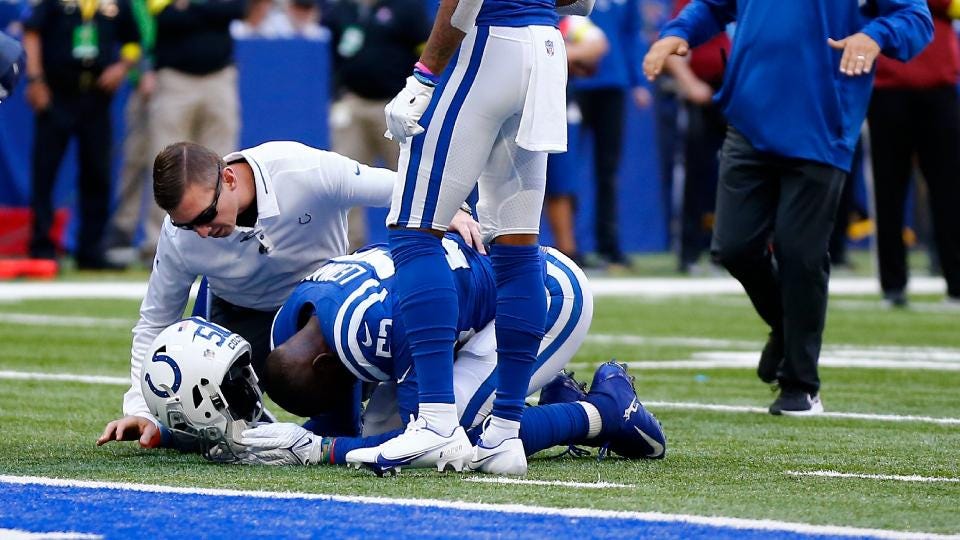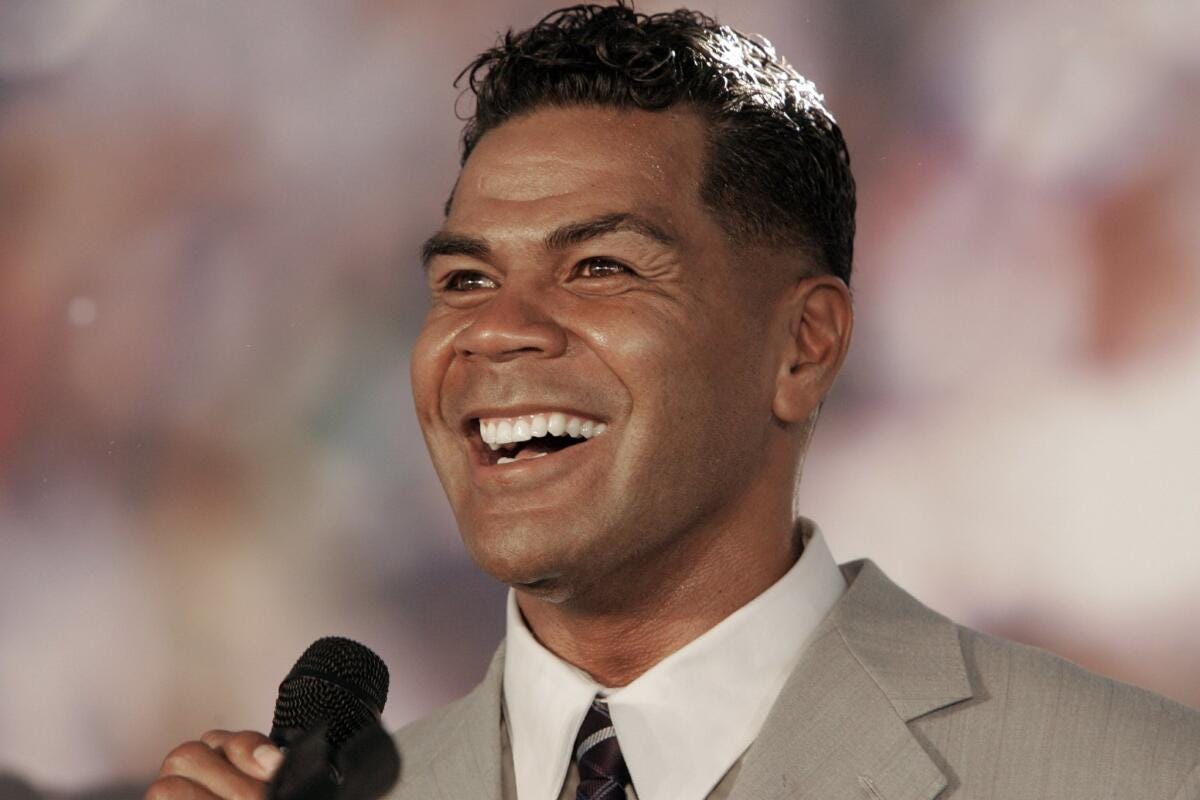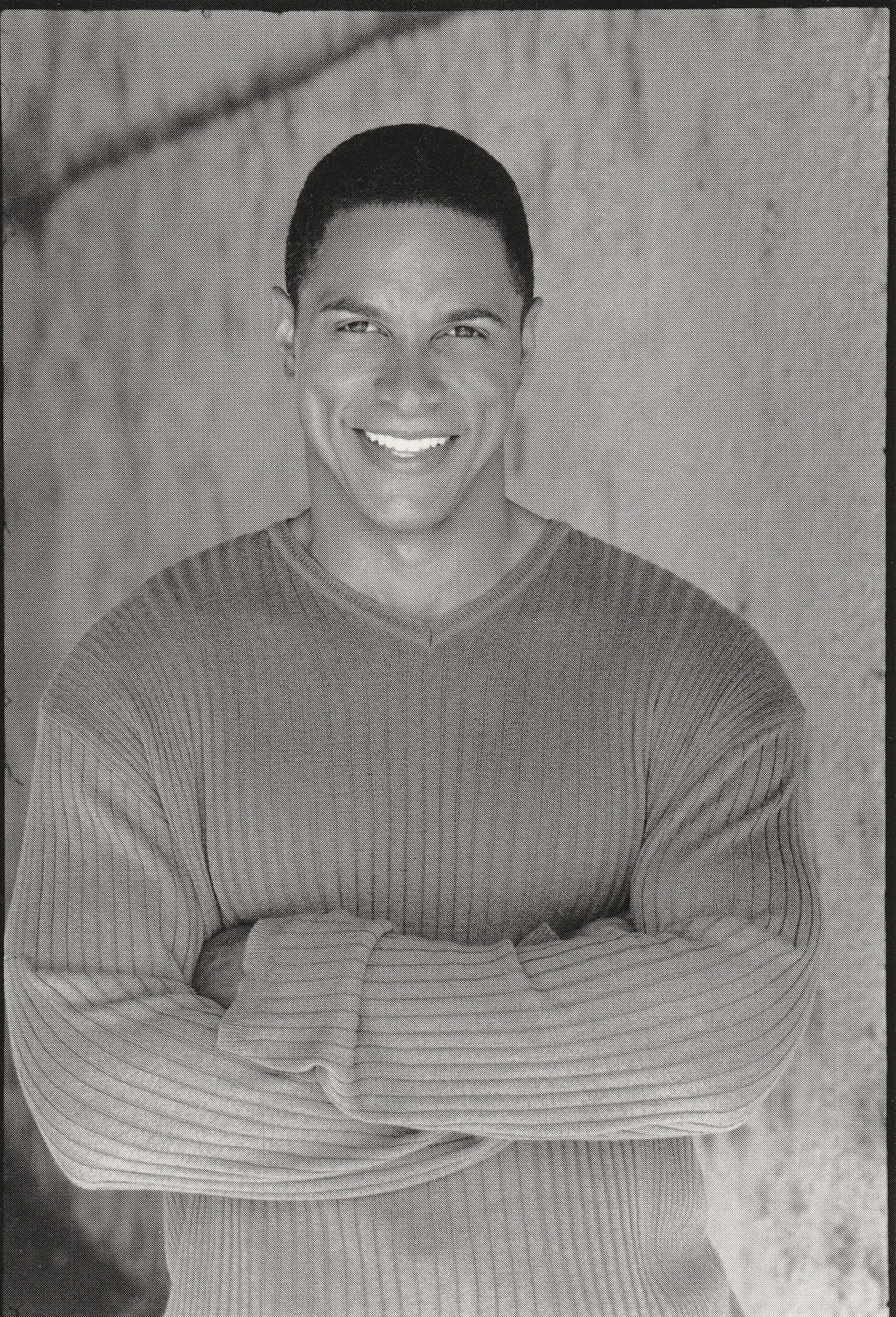You Got Your Bell Rung
“They used the terminology like I got my bell rung. You got your bell rung or you got dinged. They’re saying that kind of shit but it means you got a brain injury.”
David “DJ” Johnson is a former NFL cornerback who played eight seasons in the NFL. He was drafted by the Pittsburgh Steelers in 1989. He played for the Pittsburgh Steelers (1989-1993), the Atlanta Falcons (1994-1996), and the Arizona Cardinals (1996). At the age of 57, he shared with me his incredible journey and everyday struggles, as results of, what he believes, were 8-10 concussions he suffered while playing in the NFL, although they were not called concussions at the time. In fact, he and many other former NFL players were blissfully unaware of what concussions were, or the ramifications of them.
“We just thought this was something that happened. Once you shake it off, it's gone and there are no permanent, long-term injuries. You shake it off and that’s it. Like I repaired my finger and I’m good to go.”
Concussion Protocols in Football in the 80s and 90s
A concussion is a traumatic brain injury (TBI) that effects your brain function. It can be caused by a bump, blow, or jolt to the head, that causes the brain to move rapidly back and forth. This impact of the brain on the skull can create chemical changes and damage brain cells.
The immediate and long term symptoms of concussion are confusion, headache, visual disturbances, dizziness, imbalance, nausea or vomiting, memory loss, ringing ears, difficulty concentrating, sensitivity to light, loss of smell or taste and trouble falling asleep.
The current concussion protocol being used by the NFL wasn’t implemented until 2011 and is subsequently updated every year. The NFL now mandates a formal checklist and immediate removal of a player if they suspect a concussion was sustained during the game. The player must be evaluated by an unaffiliated neurotrauma consultant and follow a five step process before being cleared to fully participate in practice or a game. However, these protocols are all relatively new.
Players in the decades prior were not afforded the same protections. The existing mandates on helmets and player safety weren’t sufficient given the knowledge they had at the time on TBIs. There were seldom conversations about the immediate and long term ramifications of a concussion.
DJ Johnson shared during his time in the NFL the concussion “protocol” was very simple. “It was stand up if you’re down, follow my finger, how many fingers am I holding up? He’s good to go, get him back in.”
But at the time, the players didn’t have the same information as today’s players. There was not the same education of the symptoms of concussion.
“Back when we played there was no real protocol. What really pissed me off was when people go ‘oh well they knew what they were getting into’. We didn’t. We didn’t. No one ever told us that you know getting your bell rung was a brain injury. We didn’t know.”
Many players along with the general public were unaware of the effects of concussions after a football career has ended.
Life After Football
After retiring from professional football, DJ shifted his focus to acting and broadcasting. He became a sideline reporter for Fox Sports, as part of the legendary #1 NFL broadcast team of John Madden and Pat Summerall.
He has starred on the long-running soap opera As the World Turns, and guest starred on General Hospital. He has also co-starred on a variety of popular TV shows including, CSI: Miami, Malcolm in the Middle, Star Trek: Enterprise, Bones, and many others. DJ has also starred in TV commercials and print ads for Lexus, Mercedes, Verizon, and others. However, he quickly realized his dreams of being an actor and broadcaster had unexpected speed bumps.
“I noticed I was having a difficult time taking in and processing being able to remember something for 30 seconds to be able to repeat it to them on TV. A simple thing like so and so sustained an injury and he won’t be coming in the game. It was like somehow my brain was not connecting to my mouth.”
Word finding difficulties and problems with working memory are very common in individuals who suffer from TBIs. But, at the time DJ and many other players were unaware this may have been due to injuries sustained during football.
“I didn’t think much of it. As far as I knew I never had any form of brain injury. I was just thinking I was nervous on TV. But that was unlike me. I was never nervous in front of a camera.”
Many other NFL players have shared the same sentiments of noticing cognitive and language difficulties especially players who were active during years when there was no formal protocol. Unfortunately many of them suffered in silence until that pain became very public after former players began to experience tragedies.
Junior Seau
Tiaina Baul “Junior” Seau Jr. was a 12 time pro bowl linebacker for the San Diego Chargers (1990-20002), Miami Dolphins (2003-2005) and New England Patriots (2006-2009). He received the Walter Peyton NFL Man of the Year award in 1994. This award is given to a player that has a strong commitment to philanthropy and community impact. Junior Seau was championed by his teammates as a leader.
DJ Johnson and Junior were good friends. They met up annually at football camps and golf tournaments, and caught up on life. DJ reminisced on visiting Junior at his restaurant in California.
“He was the happiest upbeat always had a smile on his face guy you ever meet. He was a Samoan guy so he always had his ukulele everywhere playing. Just as jovial as you could possibly imagine.”
On May 2, 2012 Junior Seau committed suicide via a gunshot to the chest, specifically to preserve his brain after his death. His family subsequently donated his brain to the National Institute of Neurological Disorders and Stroke as a part of the ongoing Center for the study of Traumatic Encephalopathy. This organization was seeking to diagnose and understand Chronic Traumatic Encephalopathy (CTE).
CTE is a type of dementia suspected to be caused by repeated head injuries. It causes death of nerve cells in the brain, known as degeneration. CTE progressively gets worse over time and there is no cure. It is characterized by memory loss, confusion, impaired judgment, impulsivity, paranoia, anxiety and poor overall executive function. It is only able to be diagnosed during autopsy. On January 10, 2013 Junior’s family announced his brain showed definitive signs of CTE.
“When I heard that he took his own life and he was having all these problems and he was having these fits of anger I was like Junior? No Way. No Way. No way. Then you start hearing about how he shot himself in the chest to preserve his brain cause he knew something was going on his brain. That’s when I first started to become aware of all this stuff, I had never heard of CTE.”
For DJ these revelations provided context for the cognitive difficulties he had been experiencing for the past decade. At that point in time the NFL had spent decades denying and trying to cover up links that connect sports related injuries to long term brain disorders. In 2011 the first lawsuit was filed against the NFL and thousands of players followed suit. In 2013 the NFL reached a $765 million settlement over concussion related injuries to 18,000 retired players. In this settlement, they agreed to pay for medical expenses and fund research in the future.
In January 2013 the Seau family sued the NFL over the brain injuries he had sustained over his career and reached an undisclosed settlement. However, receiving a payout from the NFL for “getting your bell rung” isn’t as easy as it seems.
Support for NFL Players Following Retirement
When asked what support the NFL has offered DJ Johnson since he has been experiencing these cognitive deficits at the age of 57, DJ shared it is virtually nonexistent.
He referred to a common saying among retired NFL players: “The NFL philosophy is delay, deny and hope that they die“
“The first time I applied for disability they turned me down.” He then shared the process many players have been experiencing when attempting to get the money they require to pay for medical expense.
“To get approved for one of these lawsuits you need to go to one of their doctors. If you go to one of their doctors and that doctor approves you and they say well I don’t know and they send you to another doctor and they’re going to keep moving the goal post. ”
But for him and all of these players seeking assistance, this is their livelihood, the money that will support them for the rest of their lives, and they need this assistance to combat everyday disruptions.
“It’s not uncommon for me to forget words two seconds later. My wife will go I told you that a second ago. You just said it. I didn’t say that. You just said it two seconds ago. So when you’re doing that on a psychological test they take that as malingering. So I got turned down cold. A couple times.”
He shared that he knows several players who are currently suffering from Alzheimer’s and other degenerative diseases that are still fighting for their settlement money. “They don’t do anything. Literally. They’re trying to stall you out and hope that (you) die before they have to pay you.”
As a father and a husband these deficits are continuing to affect his life in a debilitating way. DJ shared a recent experience.
“My wife had to come find me one day. I went for a walk and I didn’t come back. She had to drive around for an hour and she finally found me and she was scared out of her mind. I had no idea. I thought I just walked around the block and I had walked out of the neighborhood down the street and was oblivious”
He went on to explain episodes of what he called brain freezes. “DJ you just said that 5 minutes ago and I think my wife is messing with me. She’d ask me, you don’t remember that at all? I have no recollection of that happening.”
He currently has to take several medications to temper these symptoms along with episodes of depression and Parkinson’s like tremors. “From the outside looking in, someone may say oh he’s fine but sometimes the days just slip away.”
He believes there is a major misconception about what many retired players experience.
“People don’t want to hear the full story of what players go through on a day to day. They’re thinking if you’re not slobbering and knocking your head against the wall in a wheelchair you’re okay. They’re not going to get into the small details of you’re having trouble speaking. Keeping your thoughts straight and getting lost.”
Advice To Current Players

When asked what advice he would give to current NFL players who may find themselves in a similar situation, he mentioned several important points.
“Make sure you document everything. ‘Cause the NFL is going to try and tell you that this didn’t happen. Document everything and get outside opinions whenever you can. If something is wrong with you or you feel something’s wrong with you and they’re telling you that it’s not. Don’t listen to them.”
He continued to relay his message about standing up for yourself.
“Don’t let someone tell you you’re not feeling what you’re feeling. Remember at the end of the day this is your life for long term. It’s cool to have the girls and the accolades and the money but all that’s going to be no good if you can’t remember your name the next day. This is your life.”
His major take away point is this is your life and your body. At the end of the day this is a job.
“Do not let them mess with your brain. This is your brain. This is going to control the way you walk, the way you talk, the way you deal with your kids, your anger. Whenever anything is affecting your brain do not ever give them the benefit of the doubt that they actually care about you. They care about you to the extent that they can make a dollar off you.”
The Future of the NFL
The NFL players association has received a lot of criticism for their current collective bargaining agreement with the NFL.
“We have the worst union. It’s terrible. This shit’s not gonna happen to baseball players or basketball players. They’re going to bind together, the Lebron’s of the league are gonna flex their muscles and stand up for the little guys. That doesn’t happen in the NFL. The big name players who could use their clout don’t ever stand up.”
Although, recent player-health-related initiatives set forth by the NFL, are welcomed by former players, DJ hopes in the future, current and former NFL players will fight for better healthcare coverage, disability, and protections after a player's NFL career ends. While concussion protocols, rules, and equipment have come a long way since DJ was in the league, there is still is a long way to go. Hopefully in the future, the NFL will strengthen former-player’s access to early-detection programs, rehabilitative services, therapy and any support players need to live a productive life. At the end of the day these men aren’t video game characters. They are sons, fathers, brothers, husbands, they are people.







Thank you for sharing .
Thank you.